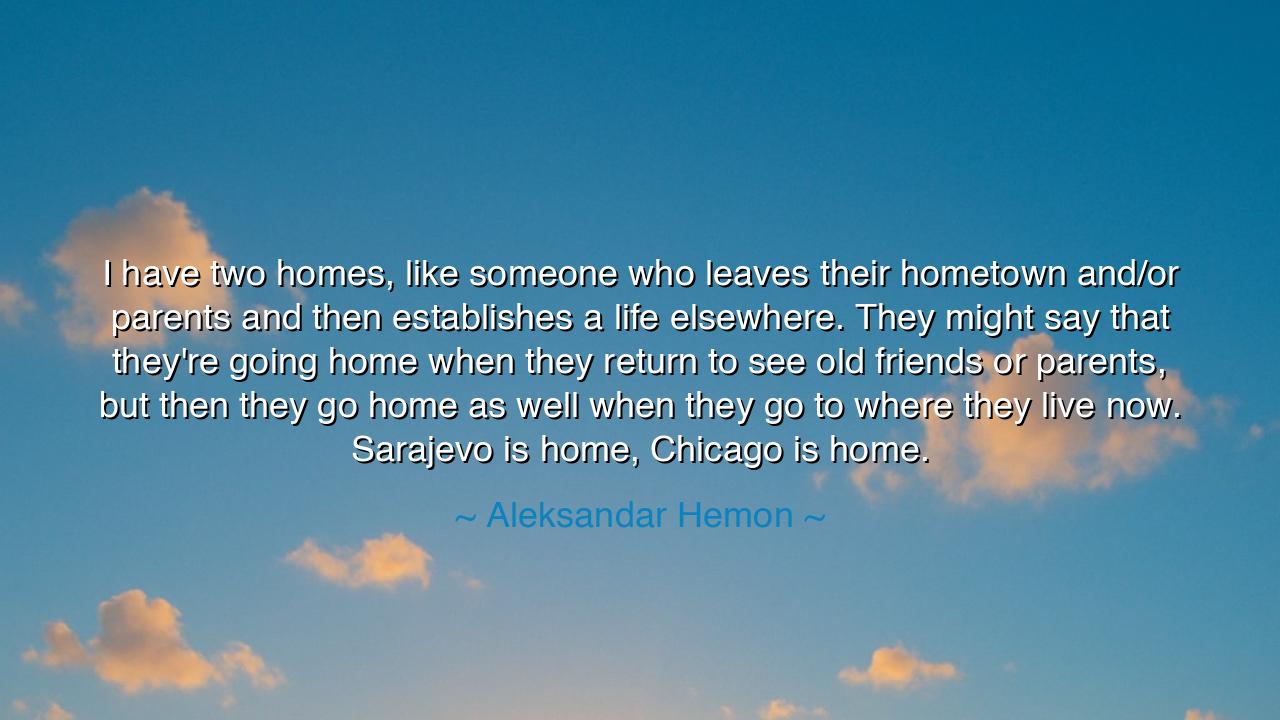
I have two homes, like someone who leaves their hometown and/or
I have two homes, like someone who leaves their hometown and/or parents and then establishes a life elsewhere. They might say that they're going home when they return to see old friends or parents, but then they go home as well when they go to where they live now. Sarajevo is home, Chicago is home.






The words of Aleksandar Hemon — “I have two homes, like someone who leaves their hometown and/or parents and then establishes a life elsewhere. They might say that they're going home when they return to see old friends or parents, but then they go home as well when they go to where they live now. Sarajevo is home, Chicago is home.” — are the confession of a soul stretched across two worlds. In these words lies the quiet ache of exile and belonging, the eternal human struggle between what we leave behind and what we become. For in the heart of every wanderer lives a double flame — one burning for the place of origin, and the other for the place of becoming. To be divided thus is not a curse but a deep and noble sorrow, the mark of those who have lived, lost, and rebuilt themselves upon foreign soil.
Aleksandar Hemon, a writer born in Sarajevo, was exiled by war. When his homeland was torn apart by the fires of the Bosnian conflict, he found himself stranded in the United States — far from the city that had shaped his language, his laughter, his youth. There, in Chicago, he built a new life, a new identity, a new language of belonging. Yet the heart cannot forget its first music. Thus, his soul became a bridge between two homes, two realities — Sarajevo, the city of memory, and Chicago, the city of renewal. His quote is not merely about geography, but about the human spirit’s ability to carry multiple truths within one body.
To say “I have two homes” is to admit that one can never fully belong to one place again. The first home — the birthplace — is eternal, even if destroyed, because it lives in memory. The second home — the chosen one — is built through labor, love, and adaptation. It may never have the scent of childhood, but it holds the dignity of survival. Between the two stands the traveler, forever walking the invisible road between past and present. His heart beats in two rhythms, and each calls to him differently — one with nostalgia, the other with purpose.
The ancients, too, understood this dual belonging. Odysseus, the hero of the Greeks, longed for his home in Ithaca even as he built temporary dwellings across distant islands. His soul never ceased yearning for the place of his birth, yet his hands learned to make homes wherever he stood. The exile learns what Odysseus knew: that home is not only where you are born, but where your heart finds rest. And when the soul has known both — the home of origin and the home of creation — it becomes vast enough to hold both love and longing at once.
To live between two homes is to live with duality — the sweetness of memory and the salt of distance. It teaches humility, for you understand that identity is not fixed, but flowing. It teaches gratitude, for you know that belonging is a gift that can be lost and regained. Those who have lived through displacement or migration — whether by war, necessity, or dream — know this truth well. They build new lives while carrying the ghosts of the old. Every meal cooked, every song remembered, every story told becomes a bridge between worlds. In this, they are the keepers of continuity — the guardians of memory.
The lesson is thus: home is not a place alone — it is a state of the soul. You may have two homes, or many, and all may be true. Do not grieve the division; honor it. Love the city of your birth without bitterness, and cherish the city of your choosing without guilt. To belong to more than one home is to belong to humanity itself. The earth becomes smaller, and your heart, greater. For the wise know that every home — whether made of marble or dust — is but one resting place along the soul’s greater journey.
So, my children, remember this teaching: build your home wherever you are, but never forget where you began. Carry your first home as a seed in your heart, and let it bloom wherever destiny plants you. When you return to your origins, bow your head in gratitude; when you live in your new dwelling, lift your face in joy. For to have two homes is to have twice the life, twice the love, twice the understanding of what it means to be human. Like Hemon, you may find that the truest home of all is not Sarajevo or Chicago, not one city or another — but the vast space within you that holds them both, shining like twin stars in the same eternal sky.






AAdministratorAdministrator
Welcome, honored guests. Please leave a comment, we will respond soon